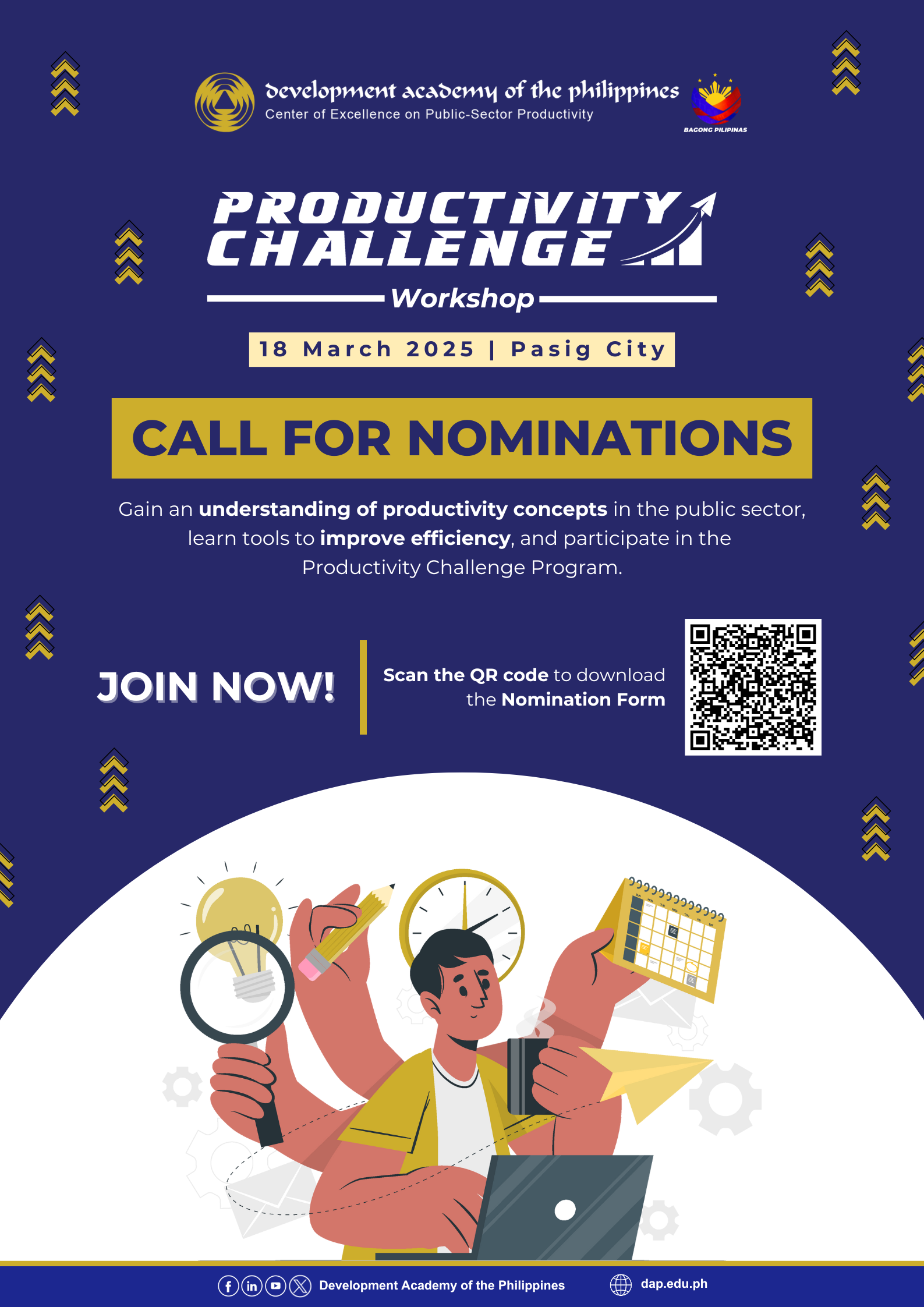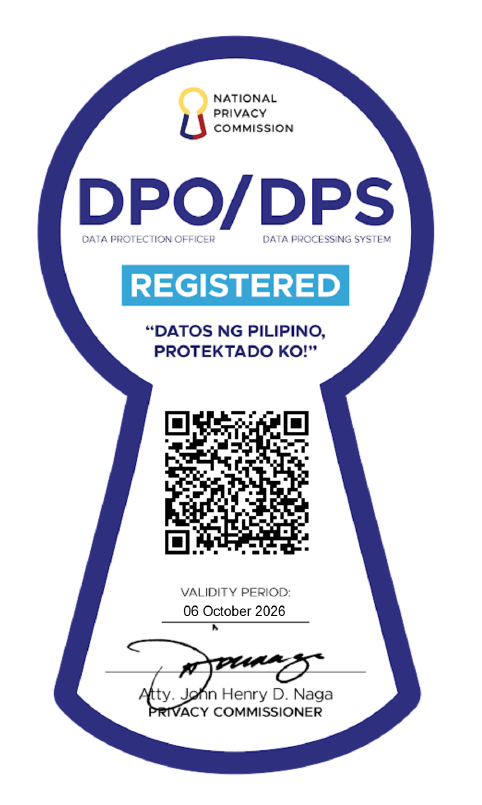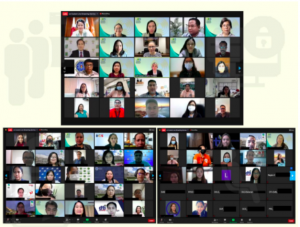
Some of the participants who attended the 2nd symposium on Institutionalizing Service Quality Standards held on July 8, 2021 via zoom.
The 2nd Symposium on Institutionalizing Service Quality Standards: Working Together to Meet Citizens’ Expectation in Frontline Government Service was conducted last July 8, 2021 by the Development Academy of the Philippines (DAP), through its Productivity and Development Center (PDC), under its Government Quality Management Program (GQMP). A total of 288 attendees via Zoom and 769 participants via YouTube (YT) live streaming participated on the day itself, with a growing 5,000 views on its recording in YT. Participants were enjoined to advocate and provide “Sapat at Mahusay na Serbisyo.
The 3-hour symposium, organized to present the results of the 2020 Citizen Satisfaction e-Survey (e-CitSat) to oversight agencies and government agencies and offices with frontline services, raised awareness on the whole-of-government satisfaction score and expectations given by citizens in 2020 during the pandemic. Participants were encouraged to consider evidence-based inputs from citizens in their efforts to improve the design and delivery of frontline government service amidst the changes arising from the COVID-19 pandemic, as well as, to identify measures to work together to meet citizens’ expectations in frontline government service.
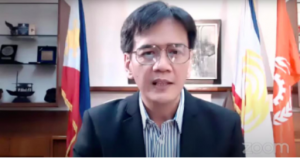
DAP President Atty. Engelbert C. Caronan, Jr., delivered the welcome remarks and discussed the three satisfaction surveys that have been conducted thus far: the 2018 Citizen Satisfaction Survey (CitSat), the 2019 Business Satisfaction Survey (BizSat), and the 2020 e-CitSat. He underscored the importance of having feedback mechanisms and measurable service quality standards. He explained the importance of how the e-CitSat’s results may enable the public sector to adapt to the demands of the “new normal” and recommended frontline government services to utilize the results of the e-CitSat to improve their service delivery and instill a culture of quality in the public sector.
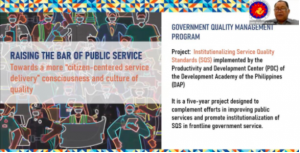
Department of Budget and Management Secretary Wendel E. Avisado, during his Keynote Message, stressed how the government should always listen to the voice of the people in order to raise the bar of public service. He emphasized how the results of the survey will provide the government with citizens’ feedback on the quality of services they have been receiving, and on key areas of service design and delivery that need improvement. By ensuring delivery of more efficient services at every level of the public’s interaction with frontline government services, the public sector may then help ordinary Filipinos in attaining their aspirations of a quality and comfortable life.
DAP Vice President and PDC Managing Director Arnel D. Abanto then provided an introduction to the Service Quality Standards (SQS) and its journey. He explained how the GQMP’s vision of improving citizen satisfaction driven by government-wide quality improvement is rooted in the 2017-2022 Philippine Development Plan (PDP), particularly in the “Malasakit” pillar of enhancing the social fabric of public institutions. The outcome of which is citizen-centered, innovative, clean, efficient, effective and inclusive delivery of public goods and services. Vice President Abanto also shared how the GQMP’s project on institutionalizing the SQS was designed to look into how existing information on customer satisfaction in the Quality Management System may be utilized to measure the overall satisfaction of citizens and of businesses. The project will also help determine a set of minimum standards that will enable agencies to focus their efforts on improving areas of frontline service design and delivery that the citizens consider very important. He concluded his presentation with a quote from Peter Drucker: “If you cannot measure it, you cannot improve it.”
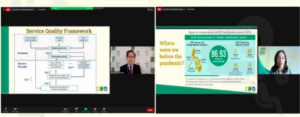
Productivity and Development Center Vice President Arnel D. Abanto and Productivity Development Research Office Director Monica D. Saliendres.
DAP – PDC Director of the Productivity Development Research Office (PDRO), Monica D. Saliendres presented the 2020 e-CitSat Nationwide Survey Results. She started off by presenting the national satisfaction survey scores from the 2018 CitSat and the 2019 BizSat. Director Saliendes also provided an account of all the top service attributes that matter to citizens and businesses according to the 2018 and 2019 satisfaction surveys. She detailed how the 2018 and 2019 surveys served as baseline studies; and that the 2020 results of the e-CitSat shed light on how happy or unhappy citizens were with their frontline government service transaction experiences during the new normal.
Reactors from two oversight agencies and one representing civil society shared their insights on the results of the 2020 e-CitSat. Director Bernadette B. Casinabe of the 8888 Citizens’ Complaint Center (CCC) detailed the services of the 8888 and how they help improve delivery of government services, as well as, the Center’s overall accomplishments. She discussed the resolution rate of calls to the Center covering the period 3 November 2017 to 31 May 2021, recounted how out of 448,105 tickets, 80.03% were already closed, 10.47% are awaiting feedback, and 9.50% are under processing., Director Casinabe closed her presentation with what the CCC espouses: “Aim not just for a good resolution rate, but to solve actual problems.”
Ms. Jaena Rosal of the Governance Commission for GOCCs (GCG) shared that as of January 7, 2020, there is a total of 119 active GOCCs under the GCG. She narrated that, in the past, GCG found it difficult to validate the Customer Satisfaction Survey (CSS) reports submitted by the GOCCs due to the lack of a standardized methodology. But, since 2018, they started using the single, streamlined format for a more efficient CSS analysis of the whole GOCC sector,
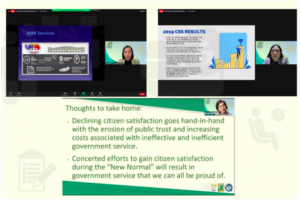
From L-R 8888 Citizens’ Complaints Center Dir. Bernadette B. Casinabe, Governance Commission for GOCCs (GCG) Ms. Jaena Rosal, and Negros Occidental Provincial Council on Women Chair Atty. Andrea Lizares-Si.
Sharing insights from the citizen’s point of view, Negros Occidental Provincial Council on Women Chair Atty. Andrea Lizares-Si called attention to the importance of deeper and more intentional collaborations with the end-user of public services – the citizens. The government must check whether the services they offer are the services that citizens actually need. There must be greater collaboration between government agencies, civil society, and the private sector throughout every stage of the policy cycle, and in the design and delivery of the frontline services. Citizens will feel more empowered when their voices are actually heard, and when their recommendations are acted upon. The government should make better use of websites and social media in gathering timely suggestions and feedback on their services in order to build open, transparent, and trust-based relationships with citizens. “Teamwork makes the dream work”, she concluded.
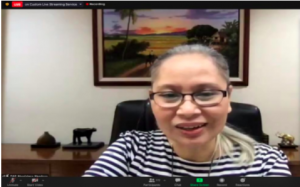
Thus, in designing the best citizen experience, everyone in government should be imbued with a “citizens first” mindset, DAP Senior Vice President for Program Operations Magdalena L. Mendoza said in her closing remarks. She expressed her hope for all agencies to maintain their focus on the citizens in the delivery of essential services. SVP Mendoza paraphrased Mahatma Gandhi’s words, emphasizing how public service is a public trust: “Citizens are the most important visitors in our premises. They are not dependent on us, we are dependent on them. They are not an interruption of our work, they are part of it. We are not doing them a favor by serving them, they are doing us a favor by giving us the opportunity to do so.” She remarked on the importance of this symposium in providing a unique opportunity to discover how the public sector can proactively identify and address the frustrations and needs of citizens. SVP Mendoza then urged everyone to work with the GQMP, the DAP, the private sector, and with civil society to elevate the quality of governance in the country, and to restore the public’s trust and confidence in the government.
The SQS Program, being implemented by the DAP – PDC, under the GQMP, fosters knowledge sharing of innovations that have been proven effective and helpful in improving organizational productivity and performance in the public sector.
The DAP, as the National Productivity Organization, seeks to empower leaders, strengthen institutions, and build the nation through pioneering, value adding, synergistic ideas, concepts, principles, techniques, and technologies addressing development problems of local, national, and international significance. DAP – PDC offers capability building, technical assistance, and research related to productivity and quality improvement. For more information, visit www.dap.edu.ph, email pdc@dap.edu.ph or call 8631-2156/2137.



